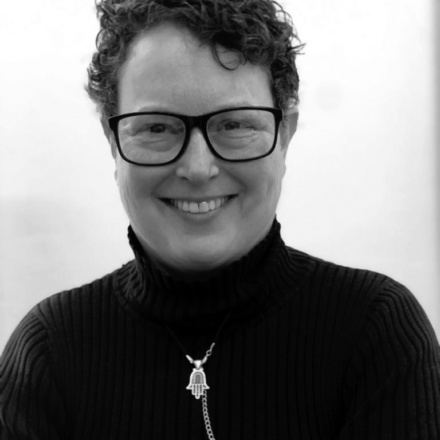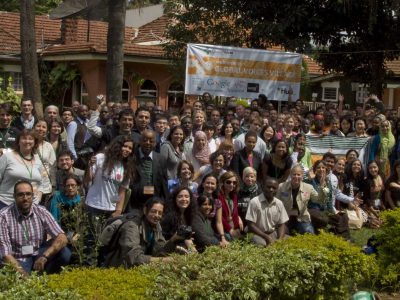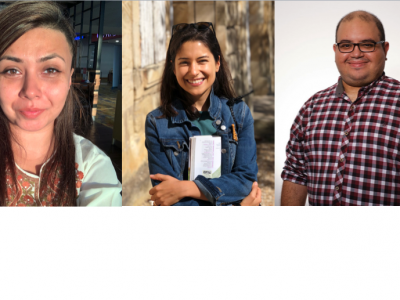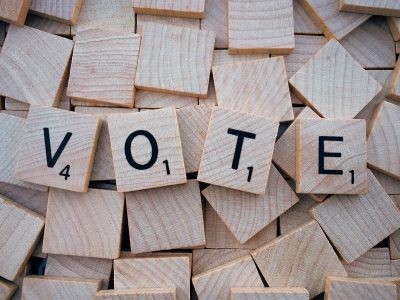
Tori Egherman.
Tori Egherman, originally from the United States, is currently based in the Netherlands. She has worked as program manager for the non-profit organization Arseh Sevom since its inception in 2010. In her other life, she tells stories as a member of the Fifth Friday Sisterhood and trains academics in storytelling techniques so that they can better communicate with lay audiences. She has written extensively on Iran as a blogger, journalist, and researcher. Tori has experience with organizational evaluation using qualitative and quantitative methodologies. She has published articles on evaluation for academic and popular journals. She speaks English, Persian, and Dutch, often in the same conversation! Tori joined Global Voices in April 2015 and has contributed primarily as a member of the Iran and Western Europe teams.
All candidates in the 2020 board elections have been asked to answer the set of questions listed below. Feel free to ask Tori additional questions in the comments area below this post!
What appeals to you most about the prospect of serving on the GV board?
I’ve been on the periphery of the Global Voices community for years now. In fact, I first became aware of it when I lived in Iran. While there, I kept a blog called View from Iran. Often, bits of the blog showed up on Global Voices, which made me curious about the site.
I admire and respect the people who have worked so hard to keep it running over the years and welcome the opportunity to dive deeper into the inner workings of GV.
What talents, skills, connections, and expertise can you offer Global Voices in your role as board representative?
For the past five years, I’ve been a member of a storytelling group that creates deep connections with small groups. We offer free training to people from all walks of life. It’s been a humbling experience.
Recently, I’ve started training academics to use storytelling methods to communicate their research to non-expert audiences. It’s been such an honor to work with them. It’s also shown me what I do well: listen, connect, and help others communicate. My eclectic interests and broad education help me make connections others miss.
For more than half a century I have been living between cultures. Even in the USA, where I was born and raised, I was not part of the majority culture. I can barely remember a time when I was not reflecting on what it means to be part of society and the world. Sometimes I wish I could just be comfortable and complacent, instead of constantly questioning. Questioning demands discomfort. It demands acknowledgement of privilege and prejudice. It demands learning.
Plus, I am a good grant writer and project designer.
As you look ahead to the next three years, what, in your opinion, should be GV’s overarching priorities as an organization?
The older I get, the more I understand how important it is to tell complex stories, especially in times of change. Here is what I think is important:
Cover topics together: I would like to see us engaged in intercultural or even interregional conversations. If we’ve learned anything from the COVID-19 virus, it’s that we are really all connected.
Focus on key topics: I’d like to go deeper into the topic areas and steer clear of breaking news, despite the fact that breaking news brings in more visitors. GV already looks at migration, freedom of speech, and surveillance. The Global Voices community of volunteers is well-placed to take on more connected stories using a “solutions journalism” methodology. Creating more collaborative pieces in the vein of the work Advox is doing would play more to GV’s strengths.
Pass it on: How do we help people understand our process more? What does it mean to edit and be edited? What are some basics of research? How do we identify our own biases and work to overcome them?
What aspect of GV’s work interests you the most?
Advox, Rising Voices, and The Bridge are my go-tos as a reader. I know I will always find interesting content there that is well-researched and has a point of view.
UPDATE: I want to stress how important GV Lingua is to the community. Without the network of volunteer translators, we would not be a community at all.
What would you like to get out of this board service experience, both professionally and personally?
What I most want is the connection with so many interesting people from so many diverse backgrounds.
What I was amazed at most at the Summit in Sri Lanka were the voices and ideas that were passionate and challenging. I remember thinking how brilliant it was to be around people so dedicated to democratic values, human rights, and free speech. As someone who grew up in the US and lives in the Netherlands, I see a distinct lack of passion about these same issues. Especially among those who are part of the majority culture.
I want to be part of a team that thinks about these issues. I also want to find a way to help Global Voices diversify its fundraising and fundraising approaches.
How will you fit board service into your personal and other professional work commitments?
Carefully…
What methods would you use to engage and listen to the community in order to represent them effectively at board level?
One of the touchiest issues is funding. Most people don’t understand how funding works. In my first non-profit job, I had to manage 17 restricted funds. The money could only be used for certain things. It was not fun, but it was a learning experience.
From what I’ve seen, how funding works causes the most tension from volunteers.
The Community Board calls have been really effective communication tools. There have also been good interventions from the staff on the WhatsApp group when needed.
I also think we can use an asynchronous video/text/voice chat to have conversations that might be hard to arrange otherwise.




1 comment
ALL CAPS ON PURPOSE:
HOW DID I FORGET TO MENTION GV LINGUA?
BIG HAND FOR ALL THE VOLUNTEER TRANSLATORS IN THE GV COMMUNITY: WITHOUT YOU THERE WOULD BE NO COMMUNITY!